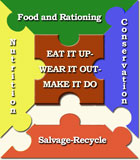

 |
|
 |
|
 In 1941, the Department of National War Services put in place a nation-wide salvage program. Households across the country were
asked to collect metals, paper, bones, rags and fat. It wasn't done for the environment but rather for the war effort. Metals
from old machinery, trucks and cars were recycled into airplanes, jeeps and tanks. Not only did this benefit the war effort but
it cleaned up the countryside. Things that no longer worked or had been replaced by something more modern were usually just
abandoned in a field, the woods or the backyard. The Summerside IODE collected enough scrap metal to raise three hundred
dollars towards a bomber plane the National IODE was buying for the air force.
Paper was recycled to churn out newspapers filled with war news and propaganda. Newspapers were the main source of communication
for the time. The military also put out papers in Europe for the soldiers.
Rags were collected for the making of blankets and bandages. Bones were made into glue for airplane construction as well as
being used in munitions. Housewives were asked to save the fat from the cooking of meat and fowl for the making of dynamite.
One pound of fat would make one pound of dynamite.
In 1941, the Department of National War Services put in place a nation-wide salvage program. Households across the country were
asked to collect metals, paper, bones, rags and fat. It wasn't done for the environment but rather for the war effort. Metals
from old machinery, trucks and cars were recycled into airplanes, jeeps and tanks. Not only did this benefit the war effort but
it cleaned up the countryside. Things that no longer worked or had been replaced by something more modern were usually just
abandoned in a field, the woods or the backyard. The Summerside IODE collected enough scrap metal to raise three hundred
dollars towards a bomber plane the National IODE was buying for the air force.
Paper was recycled to churn out newspapers filled with war news and propaganda. Newspapers were the main source of communication
for the time. The military also put out papers in Europe for the soldiers.
Rags were collected for the making of blankets and bandages. Bones were made into glue for airplane construction as well as
being used in munitions. Housewives were asked to save the fat from the cooking of meat and fowl for the making of dynamite.
One pound of fat would make one pound of dynamite.
| Glycerine is derived from fat and it is the glycerine that is used in the manufacturing of dynamite. It is also used to make cosmetics, which is why there was a shortage of make-up during the war. Many Island families saved the drippings from the cooking of meat and fowl for a number of uses. Bacon fat was used for frying instead of putting oil in the pan. As well many women fried doughnuts with their stock of fat or made molasses cookies. Goose grease was a home remedy for fighting the cold or flu. Many children would have their chest and backs rubbed with goose grease then covered with flannel. Upon waking in the morning they would find they could breathe much easier. |
| The military is often on the leading edge of technology as it strives to develop more modern and effective ways of combat. Depending on the development, civilians can be benefactors. This was especially true during World War II when great advancements were made in the fields of medicine, chemistry, communication and mechanical technology. Communication advancements were made because of the military need to exchange information. The first wireless phones were developed as was radar and its underwater cousin sonar. They were the forerunning technology of television. The Germans came up with rocket propulsion that made long-range missiles possible and they developed the jet engine although too late for use in the war. The Americans developed power steering for bomber planes and carried the technology over to car manufacturing in the 1950s. Chemistry, as used in manufacturing of goods, was highly developed during the war. Of course we all know about the atomic bomb. See what else you can find that was discovered or developed during the Second World War. |